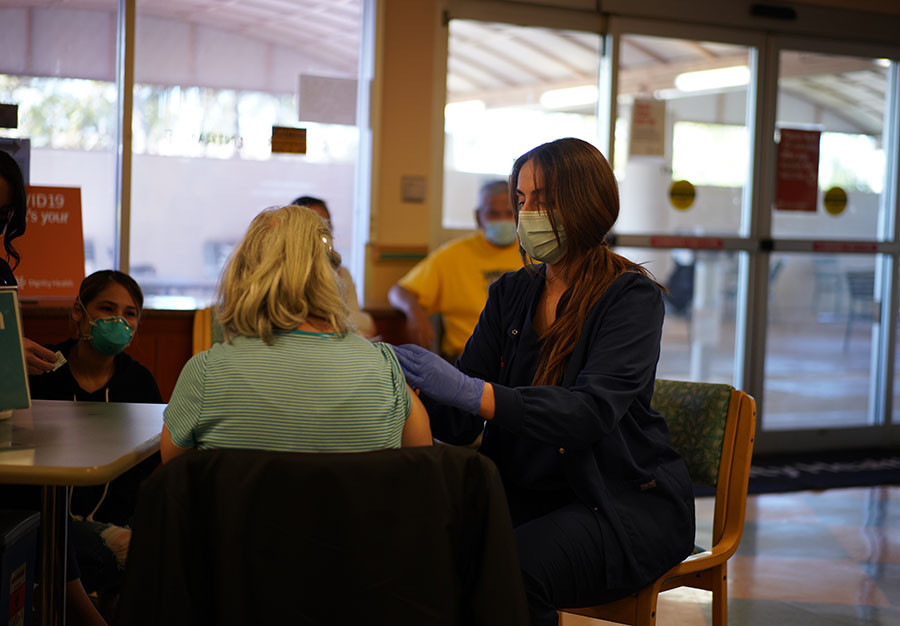 Jan. 19, 2022 — Ever since the “OpenCI” initiative was launched at CSU Channel Islands (CSUCI) in the 2016/2017 academic year, the savings for students on textbooks has risen steadily. But the most recent report on this initiative shows the most dramatic student savings to date.
Jan. 19, 2022 — Ever since the “OpenCI” initiative was launched at CSU Channel Islands (CSUCI) in the 2016/2017 academic year, the savings for students on textbooks has risen steadily. But the most recent report on this initiative shows the most dramatic student savings to date.
A mid-year report shows OpenCI saved CSUCI students almost $1.8 million —$1,769,569.73 —
over the Fall 2021 semester alone. Since 2016, Open CI has saved students over $7 million total in textbook costs.
“I was genuinely surprised — shocked, in fact,” said Associate Professor of Communication Jacob Jenkins, Ph.D. “That number from just one semester is bigger than our savings from the entire 2020/2021 academic year. And we’re on pace to save well over $3 million for students this academic year with a student body of only 7,000.”
Jenkins and Associate Professor of Nursing Jaime Hannans, Ph.D., R.N., C.N.E. are the campus coordinators for OpenCI, in which faculty members identify no-cost or low-cost course materials to use in their classes instead of costly textbooks.
Hannans and Jenkins believe the COVID-19 pandemic, which necessitated virtual learning, accelerated a trend that was already headed toward low- or no-cost digital course materials in higher education.
“I think a lot of people rethought or reevaluated the resources they were using when we had to tilt toward online learning,” Hannans said. “I think it was an important moment for higher education because it required people to look at what is accessible and effective, and maybe even expanded their thinking about what types of resources were available.”
The first zero-textbook-cost majors, called “Z-Majors” were introduced at CSUCI in 2018 — the first to be introduced in the entire CSU system. Through OpenCI, the Communication, Health Science, and Early Childhood Studies programs all became “Z-Majors,” requiring no textbook purchases but instead referring students to library and online course materials of equal quality.
Open CI coordinator and faculty members have most recently been working on the CSU’s first “Z-Track” in Nursing—a zero-textbook-cost for nursing students on the R.N. (Registered Nurse) to B.S.N. (Bachelor of Science in Nursing) track, as well as establishing a “Z-Cred” or zero-textbook-cost credential program in Special Education.
“These are nursing students who have already graduated from an R.N. program at a community college, for example, or another program, who may have their R.N. license and are coming to CSUCI for their baccalaureate degree (BSN),” Hannans said. “They have already paid for books and they’ve got tuition to think of, and they don’t need to be purchasing more textbooks.”
Also this semester, OpenCI is introducing the California Alliance for Open Education (CAopenEd,) a group of educators across the state dedicated to researching and sharing educational models that can increase the effectiveness and lower the cost of a higher education through inventive educational practices.
CAopenEd was made possible by a $25,000 grant from the Michelson 20MM Foundation, which supports higher education along with numerous other causes. The CSU Chancellor’s Office is matching that funding.
“After a statewide call for interested educators, the OpenCI committee selected a four-member inaugural cohort of CAopenEd Research Fellows who are already in the process of exploring state legislation and various models of university practices to lower the cost of higher education,” Jenkins said. “The idea behind CAopenEd is to scale what we have done here at CI to other interested campuses. Through a new website, we are trying to offer resources to other campus leaders.”
The CAopenEd website is currently under construction with a scheduled debut of March, during Open Education Week, March 7 through 11.
OpenCI grew out of the Affordable Learning Solutions (AL$) initiative launched in 2010 by the CSU Chancellor’s Office across all 23 CSU campuses.
Jenkins and Hannans believe the Open Education movement is key to removing the barriers to higher learning, documented by studies like the one OpenCI conducted showing that 85% of non-Latina/o students and 91% of Latina/o students at CSU Channel Islands felt significant stress over textbook costs.
“I think the pandemic highlighted inequities across our entire education system,” Jenkins said. “But it also highlighted the role no-cost and low-cost Open Education Resources can play in improving student access and helping to alleviate those inequities.”
